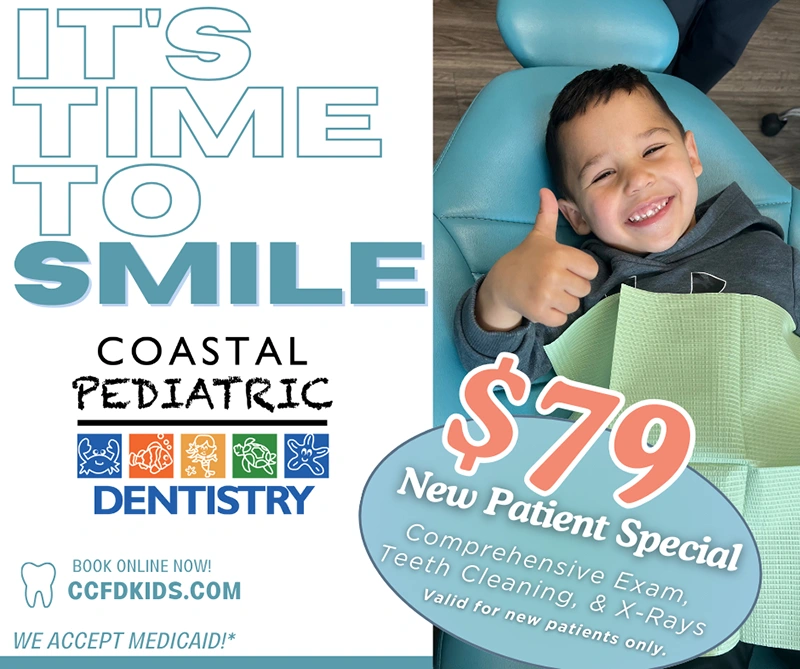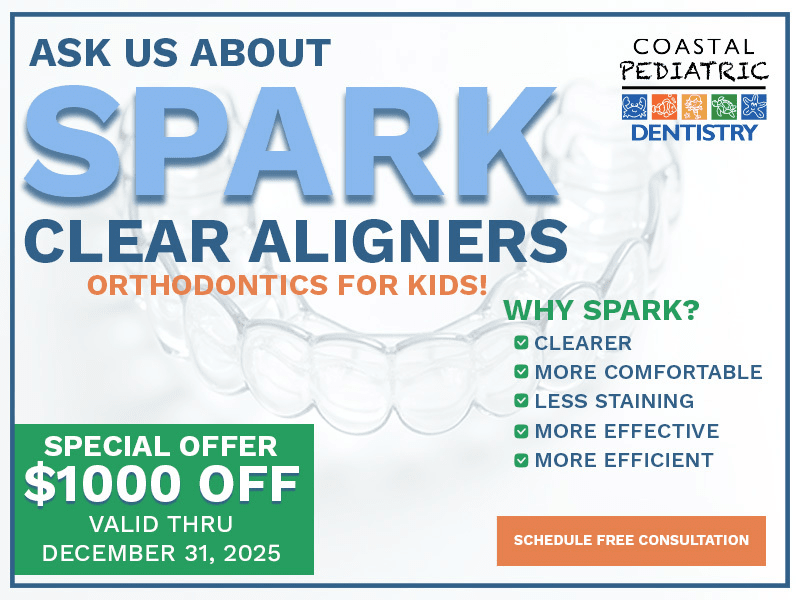What a Great Smile! Dental Bonding for Kids
Dental bonding is a versatile cosmetic and restorative dental procedure that can be performed on patients of all ages. It can repair damage, fill gaps, and improve the look and structure of teeth. Coastal Pediatric Dentistry wants all our patients to enjoy healthy, confident smiles, and if your child faces problems with chipped, misshapen or gapped teeth, your Bolivia dentist may recommend bonding treatment.
What is the Bonding Procedure?
Dental bonding is a treatment where a tooth-colored material is applied directly to the teeth—a composite resin or modifiable ceramic—that restores, rejuvenates, and improves teeth in appearance and function. This minimally invasive same-day dental solution is performed in-office, and rarely requires anesthesia unless it is being used to correct decay.
To assist the bonding composite in adhering to the tooth, Coastal Pediatric Dentistry roughens the tooth surface and applies a conditioning liquid. Since bonding requires little preparation, the maximum amount of existing tooth structure can be preserved, and the composite resin strengthens and fuses itself to a child’s natural tooth. Tooth-colored resin with a putty-like consistency is color-matched, applied, molded, and smoothed to the desired shape.
Once this has been achieved, an ultraviolet (UV) light or laser is used to harden the material. Once the bond has hardened, it is trimmed, shaped, and polished to match the rest of the tooth’s natural sheen. The overall bonding process averages 30-60 minutes per tooth.
Is Bonding a Good Solution for My Child?
Every child’s dental situation is different. If bonding is being considered purely for aesthetic purposes, you may want to consider factors like how long your child can comfortably sit still and whether the affected tooth will fall out on its own soon. Bonding is often used for pediatric patients in the following situations:
- To repair decayed, chipped, cracked, or broken teeth
- To improve the appearance of teeth – close a gap, fix alignment, make tooth shape more uniform
- To fill in the tooth root area that has been exposed by receding gums
- As an alternative to amalgam fillings (depending on location in the mouth and extent of decay)
How Should Bonded Teeth Be Cared For?
Bonded teeth look, feel, and function like natural teeth and should be cared for with a sound oral hygiene routine. Beverages like soda, dark-colored juices, and sports drinks should be avoided whenever possible to prevent staining, and we recommend a custom-fitted mouthguard be used during your child’s active pursuits to prevent damage and injury.
Eating ice, biting nails, or chewing pencils and pens chips away at bonding material (and natural teeth!), so if your child has these habits, they should work on curbing them to get the best results from bonding. If your child observes that their bonded tooth suddenly feels “different” or “funny”, ask for details—they could have chipped the bond, in which case you should call us as soon as possible!
Will Future Dental Restoration Be Needed?
The answer is: most likely. Dental bonding material isn’t as strong as tooth enamel, but usually lasts several years (about a decade) before it needs repair or renewal. Bonding resin on teeth shows wear over time and can become stained or appear dull with age. Once a child finishes growing, a more permanent restorative procedure like a crown or veneers may be advised.
In Summary: Bonding Pros & Cons
Pros:
- Takes an hour or less to apply
- Less expensive alternative to fillings or other restorations
- Looks natural – bonding solution is matched to natural teeth
- Minimally invasive
- Rarely requires anesthesia
- Does not reduce natural tooth structure
Cons:
- Can stain or dull over time
- Easier to break or chip than other restorations
- Will likely require repair or restoration in the future
No one should be able to tell your child has had dental work done—but expect lots of compliments on their bright smile! Contact us today if you have questions or would like to learn more about dental bonding for kids. Your Bolivia dentist at Coastal Pediatric Dentistry looks forward to helping your little one feel confident in their smile.
The content of this blog is not intended to be a substitute for professional medical advice, diagnosis, or treatment. Always seek the advice of qualified health providers with questions you may have regarding medical conditions.
















